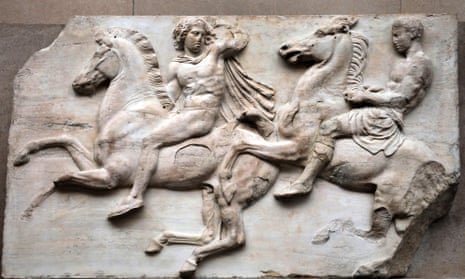Last month, Hartwig Fischer, director of the British Museum, home to the Parthenon marbles for the past 200 years, gave an interview to the Greek newspaper Ta Nea. He exlained why, in his view, the marbles should not be given back to Greece and made the – let’s call it rather unreflected – statement that taking objects from their original place into a museum in another part of the world can be a creative act. Others quickly paraphrased this as “looting art is creative” – and a perfect media storm began.
Worldwide, in dozens of articles taking up Hartwig’s statement, one could find all the pros and cons for keeping or returning the marbles. These are arguments that have been developed since the antique treasures were taken away from the Acropolis at the beginning of the 19th century: that a world-class museum would be diminished if the marbles were given back; that they are part of Greece’s heritage, as argued by the culture minister in the 1980s, Melina Mercouri; the assumption that the marbles wouldn’t have survived in Greek hands; the need for the most iconic pieces of ancient Greece to be shown and seen at their place of origin; the legality of their transfer to England; the illegality of their transfer to England. And so on.
Both sides, the Britons as well as the Greeks, have valid arguments. Maybe even the Greek gods would have had difficulty in deciding whether the marbles -should be kept in the British Museum or returned to Greece. It may well be that they would have come to the same point as they did in Aeschylus’s play The Eumenides: a stalemate. An equal number of votes for and against restitution. However, and unlike what happens in The Eumenides, in the case of the marbles, this would not be a catastrophe.
For it is not necessary to decide whether they should stay in London or travel to Athens. Instead, there is an easier and obvious solution: a 50:50 share. The British Museum keeps one half of the marbles and Greece takes the other half. Of course, there would be disputes about who gets what. But those aren’t disputes that can’t be resolved. The marbles don’t consist of one major piece and a lot of minor pieces. There are almost only major pieces. This is a unique situation – and an opportunity – since in many restitution cases sharing doesn’t work. You cannot cut the Nefertiti in half or break the obelisk of the Place de la Concorde in two. Britain and Greece should take advantage of this situation and finally end their feud.
Facsimiles could be made for each collection’s “missing” pieces, if either nation wishes to display a complete set. It will be hard for most people to differentiate the authentic ones and the copies. Maybe European Union funds could be made available, Brexit notwithstanding.
A similar solution was found for a Swiss case. In 1712, Zurich troops invaded St Gallen and its abbey library and brought back precious books and a rare globe of extraordinary size. For decades, St Gallen demanded restitution of the looted items. Finally, in 2006, Zurich and St Gallen agreed that one of the most exquisite books would be returned to St Gallen, that 40 books remain on loan from St Gallen for at least 40 years, that the globe be moved from a museum of the canton of Zurich to the Swiss national museum and that a facsimile of the globe be produced for St Gallen and funded by the city of Zurich.
This sharing solution is not a Swiss idea. It was the ancient Greeks who invented it. Or, maybe more accurately, sung of it:
“Let not the thirsting dust soak up the purple blood
of citizens, nor let men
in passion for vengeance wreak
vendetta and feud in the state,
but men of like mind
let them share with one will
both their joys and their objects of hate.
For this is the source of much health among men.”
(From The Oresteia of Aeschylus, The Eumenides, translated by Robin Bond)
